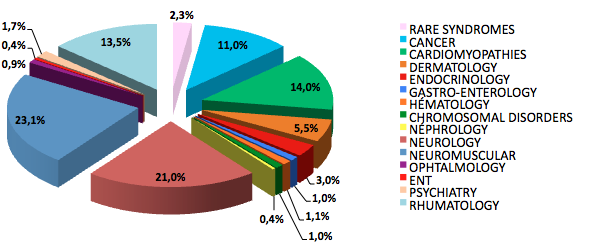Since its creation in 1990, Genethon’s DNA and Cell Bank has aimed to promote advances in genetic research by providing the scientific community with the high-quality services of a human cell and product bank.
The first European bank for genetic diseases, it operates as a service for the entire French and international medical and scientific community.
Thanks to the samples stored in the bank, French work on decoding the human genome has been carried out, and the first transcriptions were deposited with UNESCO by the Genethon teams in 1992.
Since then, the bank has evolved into a service organisation and is recognised as a driving force and a server of European-level know-how in the management, quality assurance and enhancement of biological samples.
From the outset, the bank has been committed to providing a high-quality service to the scientific community and to meeting the expectations of patients and their families.
Over the years, it has followed quality procedures to ensure better durability and traceability of the bank’s samples.
In June 2009, the bank was certified by AFNOR to the NFS 96-900 standard.
It is currently ISO 20387 certified.
Genethon’s DNA and Cell bank performs the following annually:
- 2,000 lymphoblastoid cell lines
- 3,000 DNA extractions
- Primary cultures of myoblasts and fibroblasts of around 100 biopsies
Total storage capacity: 455,000 samples
Activities of the DNA and Cell bank
The bank’s mission is exclusively research-based and it has no diagnostic role. It is open to all researchers in France or overseas wishing to store samples, or utilize services (such as extraction, establishment of lines, etc.).
Each sample received at Genethon is coded to guarantee anonymity of the donor, in accordance with the rules set out by the French data protection authority (CNIL).
List of services offered by the DNA and Cell Bank
- Collecting and receiving biological material from families suffering from genetic diseases, as well as the identification data needed to monitor the samples, while guaranteeing patients’ anonymity;
- Processing samples to make them available to the scientific community:
– DNA extraction and quality control, isolation of serum and plasma;
– Isolate PBMC lymphocytes, and establish B lymphoblastoid lines, and quality control;
– Establish primary cultures of myoblasts and fibroblasts from muscle and skin biopsies and quality controls;
– Pre-clinical cell culture, establishment of banks and quality control; - Storage of samples for future research and ensuring their long-term preservation in the best possible conditions, at -20°C, -80°C and -196°C in liquid nitrogen;
- Distributing the samples required for ongoing research in compliance with the principles and laws of bioethics.
Collaborate with the DNA and Cell bank: how it works
All collaborations with the DNA and Cell Bank require a written request addressed to Dr. Safaa Saker-Delye.
Sending biological resources
All requests to send, process and store samples are covered by a collaboration agreement specifying the rights and obligations of the parties.
Services are provided in accordance with the pricing scale.
| Group of pathologies | Number of individuals | Number of families |
| Cardiomyopathy | 5,707 | 1,999 |
| Dermatology | 6,745 | 1,261 |
| Endocrinology | 1,431 | 723 |
| Gastroenterology | 172 | 150 |
| Hematology | 818 | 212 |
| Chromosomic diseases | 411 | 276 |
| Nephrology | 309 | 71 |
| Neurology | 20,538 | 6,963 |
| Neuromuscular diseases | 19,816 | 7,435 |
| Ophtalmology | 451 | 117 |
| Otorhinolaryngology | 18 | 1 |
| Psychiatry | 1,734 | 449 |
| Rhumatology and bone diseases | 5,520 | 1,560 |
| Rare syndromes | 2,244 | 872 |
| Total | 65,914 | 22,089 |

DNA and Cell bank: management and traceability
Management and traceability of samples is achieved via a computer database developed at Genethon. This base has been declared and authorized by the CNIL. Genethon’s DNA and Cell bank is certified according to the CRB AFNOR NF S 96-900 standard.
Charter and instructions for sampling and delivery of biological resources
A charter (French version) governs relations between the DNA and Cell Bank and the individuals using its services, in accordance with the ethical principles governing the collection of human products, the legislative and regulatory provisions governing the sampling, processing and storage of said products and the related information.
The DNA and Cell Bank follows the Instructions for sampling and transport of biological resources specified.
Partners
Genethon’s DNA and Cell bank is an IBiSA platform. As such, it collaborates with a number of partners.
- Institut national de la santé et de la recherche médicale (Inserm)
- Centre national de la recherche scientifique (CNRS)
- Patient associations (RETT syndrome, Anti-autism foundation, etc.)
- Neuromuscular disease research networks supported by AFM-Telethon.
- Cancer research centers (Institut Curie, Gustave-Roussy)
- Partnerships with scientists and institutions in countries in the Mediterranean and the Middle East on rare diseases (Algeria, Tunisia, Morocco, Turkey, Lebanon, Syria, Iran and Saudi Arabia)
- Partnerships within European projects: European consortium for research on rheumatoid arthritis (ECRAF), European research project on ankylosing spondylarthritis (EuroAs), EuroBioBank (European network of banks for research on rare diseases), European Research Infrastructure Bio-Banking and Biomolecular Resources (BBMRI) and Treat-NMD.

